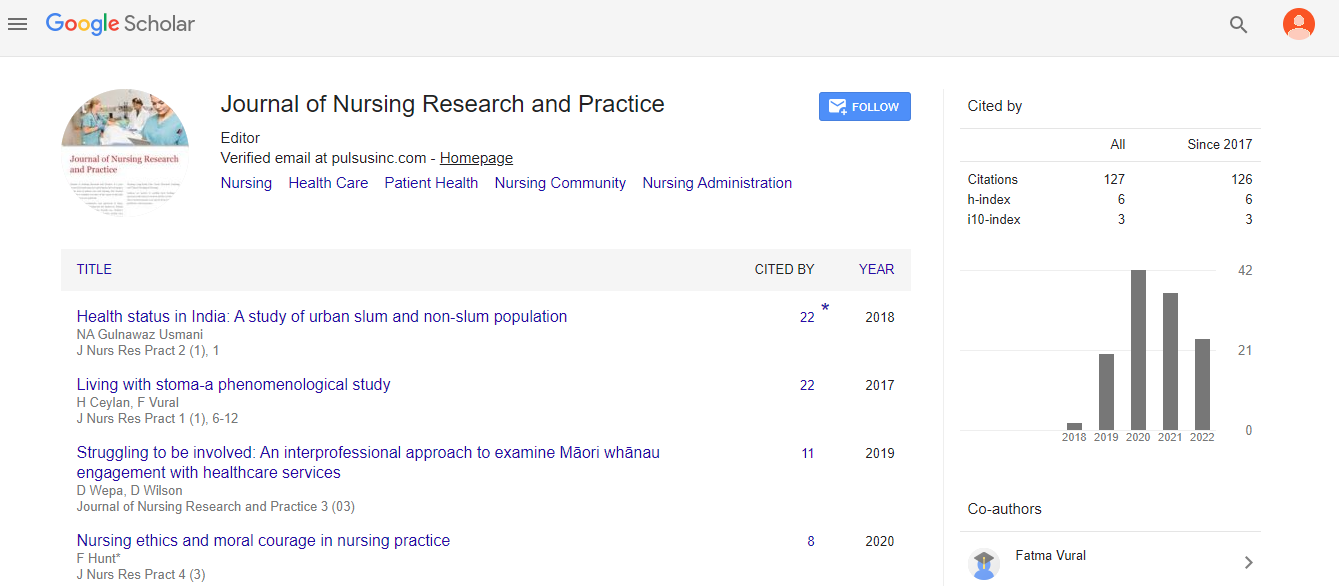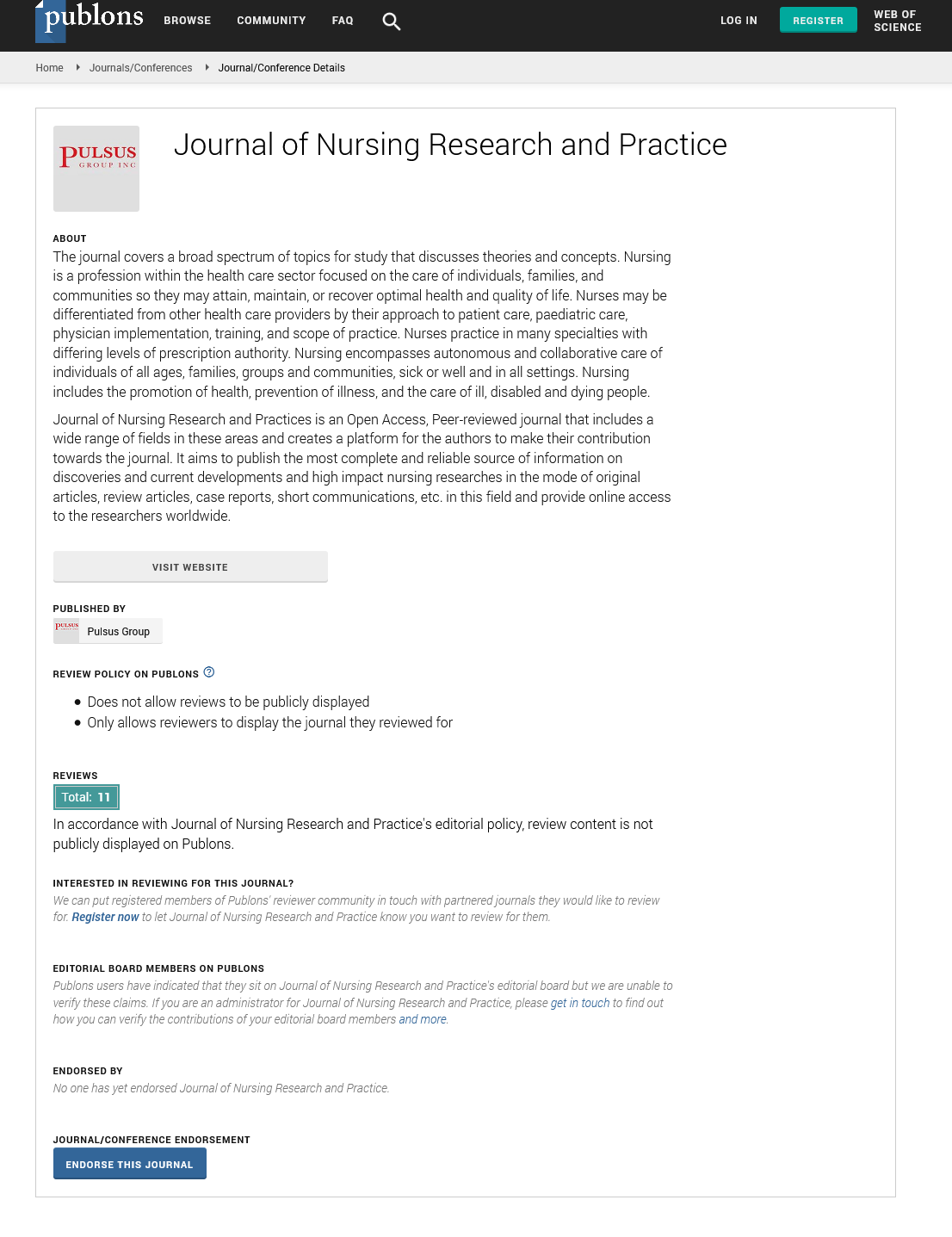The training of health promotion officers in Côte d’Ivoire: Socio-anthropological issues in community interventions
Received: 06-Jul-2020 Accepted Date: Jul 24, 2020; Published: 31-Jul-2020
Citation: Anoua ASJ. The training of health promotion officers in Côte d’Ivoire: Socio-anthropological issues in community interventions. J Nurs Res Pract. 2020;4(3): 01-04.
This open-access article is distributed under the terms of the Creative Commons Attribution Non-Commercial License (CC BY-NC) (http://creativecommons.org/licenses/by-nc/4.0/), which permits reuse, distribution and reproduction of the article, provided that the original work is properly cited and the reuse is restricted to noncommercial purposes. For commercial reuse, contact reprints@pulsus.com
Abstract
Objective: The epidemiological transition remains a major challenge for public health in Côte d’Ivoire. It stems from the medicalized vision of the health system. In fact, the action plans of the various national programs are in no way officially supported by any sociological support study. The implication of such an attitude is due to sociological resistance in the acculturation process. In view of the importance of the human component, we deduce the complexity of this epidemiological monopoly in the public health approach in Côte d’Ivoire.
Interventions: We propose establishment of a training system in health promotion anchored in lifestyle habits. It is a matter of guiding different social strata of population towards the adoption of behaviours in favour of a general well-being, in addition to control of their own health. It is in this context that the opening in 2014 of community health training program at Alassane Ouattara University, meets a healthy wait. This stream recruits nurses, midwives and doctors. They are trained in theory and practice from a multidisciplinary perspective in order to establish the mechanism of behavioral change in the population.
Results: Health promotion officer intervention takes into account cultural markers of disease or health, its appropriation of anthropological approach with a view to reinforcing these skills in participatory and community approach.
Conclusion: It is envisaged for these new graduates, the creation of a national network to maintain relations, strengthen the spirit of professional belonging and develop a framework for collaboration and exchange of experiences for improving skills.
Keywords
Community health; Health promotion officer; Anthropological approach; Health education
Introduction
The problem of the epidemiological transition remains a major challenge in public health in Côte d’Ivoire. It concerns parasitic and infectious diseases, the question of mental health, so-called chronic diseases and maternal and child health problems. And as if that were not enough, to this dark and overloaded picture, is added the spectacle of new, more severe diseases. It follows logically from a life expectancy backward [1]. This worrying situation stems from the medicalized vision of the health system. In fact, the action plans of the various national programs are in no way officially supported by any socio-anthropological accompaniment study [2]. The reference structure for prevention remains the service of epidemiological surveillance. The latter in his approach favors statistical and medical data [3]. This opposite trend is fueling the indifference and marginalization of the social and cultural dimension of health problems. The implication of such an attitude is the fact of the phenomenon of sociological resistance in the acculturative process. In this context, the human component constitutes a dimension of importance, since it respects the different cultural and social anchors of knowledge at the community level within cultures in different types of population [4]. Indeed, how a generic communication recipe about a health problem, can produce the same impact and moreover positive, on all the cultural communities having adopted different ecosystems, beliefs and contrary sanitary practices. From this we deduce that this epidemiological monopoly underlying the public health approach in Côte d’Ivoire seems to us to be wrong. How to reduce this complex health situation? And how to get people to take charge of their own health individually and collectively?
Interventions
Faced with these questions, we propose the establishment of a training system in health promotion anchored in lifestyle. The aim is to offer the auditors concerned new acquisitions in order to guide the different social strata of the population towards the adoption of behaviors in favor of a general well-being, in addition to the control of their own health [5]. It is in this context that the opening in 2014 of the community health training program at Alassane Ouattara University in Bouaké, meets a healthy wait. This stream recruits nurses, nurses, midwives and doctors. They are trained in theory and practice in a cycle of two years and in a multidisciplinary perspective to establish the mechanism of behavioral change in the population. The objective of this article is to show the contribution of socio-anthropology in the implementation of a community health project.
Results
Under this heading, it will be a question of indicating the foundations of the use of socio-anthropology in the participative and community approach. They build on the issues of community diagnosis and the skills of the health promotion officer.
The issues of community diagnosis
Knowledge of the factors that explain health problems in the community takes into account the socio-cultural markers of the disease and/or health as well as the health promotion agent’s involvement in the community approach.
Understanding the social and cultural dimension of health problems
Any public health problem is based on endogenous and local knowledge. These stem from the perceptions, attitudes and behaviors of social groups. To explain and understand this human component of health problems through community diagnosis is through the socio-anthropological approach. Indeed, this process proposes to adopt a qualitative, interpretative, more sensitive approach. It takes into account the variability of socio-cultural contexts in defining health problems. For this, disease design, risk behaviors and health-related values are variables to be considered social products in a process of meanings. It is important as part of a community approach to take into account local knowledge rooted in cultural trajectories [6]. It must be understood that they are the specific historical foundations of self-esteem promoting people’s awareness in order to identify risk factors and priority health problems. This quest in the participatory and community approach is to trace this production of local knowledge. In this area, it treats individuals as key components of the social and cultural environment [7]. In reality, it gives people the opportunity to question their social trajectories in order to understand their vulnerability in relation to a given public health problem. This perspective adds value to the health promotion officer.
The implications of the health promotion agent in the community approach
The socio-anthropological approach aims to accompany the knowledge of risk factors in favor of improving community diagnosis. For this, the opening of health problems to sociocultural facts is a real challenge [8]. She recommends immersion of health promotion agents in the community. It’s a question of moving to a holistic principle. In this approach, the health actors take ownership of the socio-cultural environment and the populations intervene in the identification of the risk factors related to a given health problem. This secular knowledge relating to health respects the representations of the populations, their daily lives and, the reference frames of their behaviors. This knowledge contributes to reducing social inequalities in health by taking into account the knowledge of the cultural practices of the community. Following this path, we retain factual orders in terms of stakes.
Issues of socio-anthropology in the skills of the health promotion agent
In the intervention of the health promotion officer, the socio-anthropological approach implies the consideration of ethical and professional issues with a view to reinforcing these skills in the participatory and community approach.
The ethical issue
In our community health context, there is no question of demonstrating the superiority of scholarly medical knowledge over the social representations of community members across the street [9]. This means for the health promotion officer that it is not a question of adopting either an attitude of indifference, or an attitude stigmatizing all forms of belief. On the contrary, the reflex to be developed by the health promotion agent vis-à-vis the members of the community must be to fight against any value judgment whatever the level of education, the physical appearance and the forms of expression of emotions in the anguish and suffering of members of the community. Indeed, this attitude of serenity and caring is an important objective element of the construction of the contract of trust with the members of the community.
The professional issue
The health promotion officer is required to adopt appropriate behavior, that is, to have appropriate anthropological knowledge to meet the expectations of community members. The socio-anthropological approach must be understood as a tool for immersion in the community. From this point of view, it contributes to strengthening the skills and increasing the performance of the health promotion agent by controlling the socio-cultural environment of the community [10]. This allows him to grasp, understand without prejudice, the various attitudes and behaviors related to a given health problem.
Conclusion
Ultimately, we consider that the socio-anthropological approach in the field of community health involves immersing the health promotion agent in the community in order to explain and clearly understand the behavioral and psychological logic, in relation to a given health problem. To this end, the socio-anthropological approach is based on a participatory and community method, in order to avoid the risks of sociological blockages and resistance in the dynamic process of taking charge of their own health by the communities themselves. It is at this level that the whole problem of the acceptability of Public Health projects lies. Therefore, the socio-anthropological intervention is essential upstream to the efficiency of communication for social and behavioral change, without which education action, the members of the communities would always be bathed in carelessness and ignorance.
Funding
This work was supported by ourselves.
Declaration of Competing Interest
The author declares no conflicts of interest.
Acknowledgements
The author would like to express his gratitude to the head of the Training and Research Unit Communication, Environment and Society of the University Alassane Ouattara for having made it possible to reflect on training in community health in this joint institution.
REFERENCES
- Ministère de la santé et de l’hygiène publique (MSHP). Rapport annuel sur la situation sanitaire 2015. Abidjan: République de Côte d’Ivoire, 2016: 1-316.
- Ministère de la santé et de l’hygiène publique (MSHP). Plan national de développement sanitaire 2016-2020. Draft Consolidé. Abidjan: République de Côte d’Ivoire, 2016: 1-88.
- Ministère de la santé et de la lutte contre le sida (MSLS), l’Institut national de la statistique (INS) et ICF International. Enquête Démographique et de Santé et à Indicateurs Multiples de Côte d’Ivoire 2011-2012: Rapport préliminaire.Calverton, Maryland, USA: MSLS, INS et ICF International, 2012: 1-561.
- Anoua ASJ. Obstetric Culture in the Development of Reproductive Health. Gynecology & Reproductive Health 2018; 2(6): 1-4.
- Anoua ASJ. Training of Health Workers in Côte D’Ivoire: The Socio-anthropological Approach in Public Health Interventions. CPQ Women and Child Health 2019; 3(1): 01-05.
- Cherubini B. Introduction. Des évolutions attendues en promotion de la santé. Dans: Bernard Cherubini éds. Agir pour la promotion de la santé. Une politique ouverte à l’innovation ? Toulouse, ERES: Action santé, 2011: 9-28.
- Fond-Harmant L, Dia A. Santé publique et transfert de compétences Nord-Sud: les conditions d'une approche inter-culturelle. Santé Publique 2008; 20(1): 59-67.
- Debout C. Sciences des soins infirmiers: réflexions épistémologiques sur le projet d'une discipline. Recherche en soins infirmiers 2008; 93(2): 72-82.
- Massé R. Relativisme culturel et relativisme éthique. Pour une approche critique dans l’engagement face aux populations locales. Dans Christine Bellas Cabane éds. Soins de santé et pratiques culturelles. Paris: Karthala, 2008: 101-123.
- Moynihan S, Paakkari L, Välimaa R, et al. Teacher Competencies in Health Education: Results of a Delphi Study. PLoS One 2015; 10(12): e0143703.






